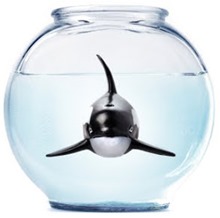Orcas Are Not Thriving at SeaWorld

In a September 4, 2014, guest column titled “SeaWorld Responds” published in Florida Today, SeaWorld veterinarian Dr. Chris Dold said:
“[I] can unequivocally state that our whales, along with every other animal in our parks, are thriving, both mentally and physically.”
But how do you define “thriving”? According to Thomas White, who teaches ethics at Loyola Marymount University:
“Full, healthy growth and development of the traits, skills and dispositions that allow a being to have a satisfying and successful life as a member of that species.”
Thriving has everything to do with a species’ characteristics shaped by evolution and adaptation. And, as if it weren’t self-evident enough that a species adapted to long distance travel, hunting, and lifetime social relationships is fundamentally at odds with being in a marine circus like SeaWorld, we can still fall back on the abundant empirical scientific data which show that orca nature is fundamentally incompatible with conditions at SeaWorld.
Dr. Dold goes on to say:
“What’s interesting to me is that so much of those who criticize us are basing that on their own opinions.”
We are all familiar with the exasperating climate change deniers who refuse to acknowledge that we humans are creating global climate catastrophes and mass extinctions. They are best known for their data-poor rhetoric and, especially, their insistence that anthropocentric climate change is still a matter of debate. In the face of the overwhelming evidence they continue to maintain that the issue is still “just some people’s opinion.”
The science tells us unequivocally that orcas cannot thrive, or even survive for very long, at places like SeaWorld.As most of us have figured out, it is best not to take the bait of those who try to draw us into endless battles that have already been settled by facts and evidence.
The same can be said for the so-called “evolution versus creationism” debate or, back in the 1960’s and 70’s, the “debate” over the health effects of tobacco smoke manufactured by the cigarette industry to confuse the public.
And now we can add SeaWorld’s arguments to the long list of failed crusades currently being kept on artificial life support.
SeaWorld wants to convince the public that the question of whether the orcas at their marine circuses are thriving is a matter of legitimate debate and differences of opinion. But the issue has, in fact, been settled. We now have the science that tells us unequivocally that orcas cannot thrive, or even survive for very long, at places like SeaWorld.
Here are a few findings from the scientific literature:
- Annual mortality rates for orcas are 2.5 times higher in captivity than in the wild.
- Most captive orcas die by the early 20’s (wild orcas can live to 60-90 years old).
- Captive orcas exhibit several behavioral abnormalities that are rare or absent in the wild and symptomatic of psychological stress and trauma. These include hyper-aggression toward other whales, swimming in a stereotyped manner, maternal rejection of newborns, self-injurious behaviors such as breaking the teeth on hard surfaces, and serious and lethal aggression toward humans.
These are not “opinions”; they’re facts. And those of us in the scientific and animal advocacy fields need to call SeaWorld on their deceptive statements.
Even more important, we should not let the rhetoric and empty arguments distract us from our real goal, which is not to win an already-settled debate with SeaWorld but to bring an end to dolphin and whale captivity.
10 Replies to “Orcas Are Not Thriving at SeaWorld”
Comments are closed.

Great summary, Lori, thanks!
Thank you for this slam-dunk post Dr. Marino. I am reposting your article as the headline for today’s news on Cetacean News Network.
Thank for you knowledge and insight into the captive dolphins and whales.
great points. as someone new to this field, it would be helpful if some of the references were listed so i could read more in depth. thanks!
Dear Steve – If you email me at the above address I can send you some material.
Great article, Lori! In the lawsuit against the elephant exhibit at the Los Angeles Zoo, the judge ruled that the zookeepers were “delusional” in thinking that “their” elephants were healthy or happy. So it is with these people too. Also, as Upton Sinclair wrote so brilliantly- “It is difficult to get a man to understand something when his income depends on his not understanding it.”
Good comments Patty!
Thank you for this, trying to show delusional people the actual facts is like trying to plait fog sometimes.
This is a good template for answering that baseless assertion. Straightforward, science-based, and to the point.
[…] article originally appeared on Kimmela.org on November 24, 2014. It has been reprinted here with […]